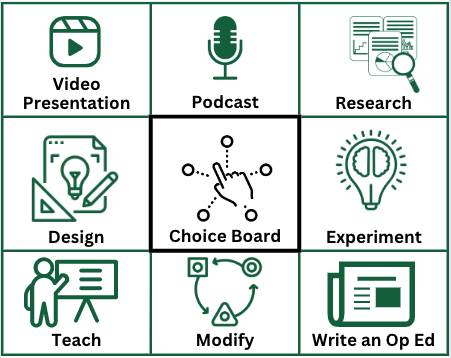Outcomes-based Assessment
Traditional forms of assessment, often norm-referenced, are increasingly mixed with outcomes-based assessment in campuses in Canada. Often, outcomes-based systems start in professional programs with accreditation standards, where it is important that all graduate have minimal standards of competence, and are not just rated in comparison to their peers. As the use of outcomes-based teaching and assessment is becoming more common, people are wondering what the difference between traditional and outcomes-based assessment is.
What is outcomes-based assessment?
- It starts with faculty members articulating what they want students to be able to do when they complete the learning. This is called an outcome and it is different than thinking about what you will teach, because it is focused on the end result for students that you built the course for (learn more about outcomes and how to write them)
- Outcomes-based assessment is the deliberate collection of evidence of student learning based on outcomes. It yields a mark relative to the outcomes (criterion referenced) rather than other students.
What do you do differently in an outcomes-based system?
- Planning: You need to clearly know what level of skills and knowledge you will accept as competent or successful performance by students (instead of what mark), then plan the assessments to measure it and the instruction to teach it.
- Assessment: You make an effort to give more feedback early, and give more attempts. You pay more attention to most recent evidence. A good way of thinking about this is a driver’s test. You don’t average in the first time you practiced with your final road test. Even if you fail your road test once, you get the score from your second attempt, not the combined score from your first and second, because the goal is to measure how competent you’ve become, rather than average in all attempts.
- Calculating grades: In an outcomes-based system, you group and weigh by outcome, not by assessment task. This means that outcome 1 might be 10% and outcome 2 could be 8% of the final grade. An individual test might have 50% of its marks in outcome 1 and another 50% in outcome 2. In a syllabus, you’d explain your weighting by outcome, not by how much the assignments and final are worth.
Why would you bother to do this?
- Students know exactly what you are trying to have them learn, and are more able to take responsibility for learning it. As a result, they learn more deeply, and they more accurately identify what specifically they need to work harder on.
- Because students understand more about what you want them to know and be able to do, you mark fewer weak assignments, which saves you time and frustration
- It allows you to clearly understand how your students are improving over time on each of the outcomes you set. That makes it easy to modify your course to make it more effective
- Outcomes-based assessment is helpful for seeing how your course contributes to student success in the program, or gives a clear indication of how well student learn specific pre-requisite knowledge and skills you are trying to teach them
Why might you choose not do this?
Aside from the effort involved in trying something new, even if it might improve student learning, there are two common reasons to be concerned:
- The outcomes might be too focused on some government or institutional agenda, limiting your choice
- Students might focus on the outcomes instead of the learning
In response to #1, if you set your own outcomes, it is unlikely you would pick something you thought was unworthy or too low level, but there are times where an external body (like in accreditation) may set an outcome you would not have chosen to insure a progression of learning over courses and years. With regards to #2, I think we all want students to focus on the learning, but if they don’t know the outcome, they actually typically focus on the assessments, asking questions like “will this be on the test”, which indicate the are unclear on the learning and just focused on the grade.
What goals of the university is this connected to?
Outcomes-based assessment is directly connected to 3 key commitments we have as educators on campus, according to our Learning Charter:
- Ensure that assessments of learning are transparent, applied consistently and are congruent with learning outcomes
- Design tools to both assess and enable student learning
- Learn about advances in effective pedagogies/andragogies
Read the other chats related to Our Learning Charter to learn about other educator commitments.


